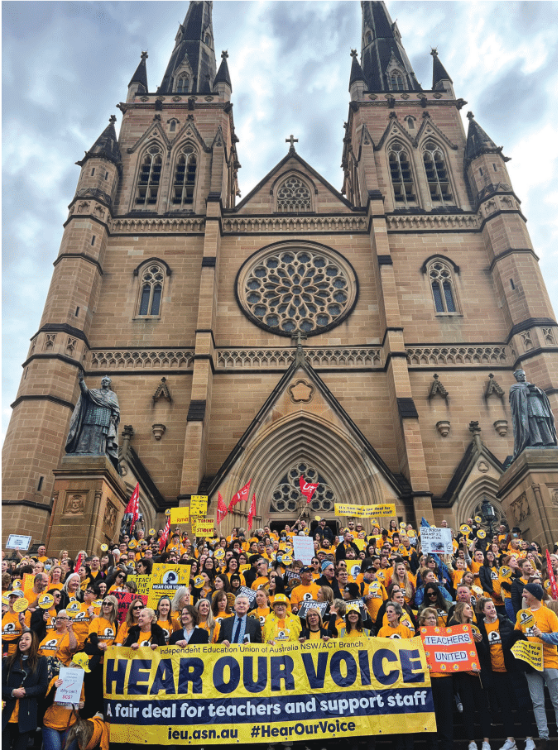First strike
MN: I’ve been involved with the union since the late 1980s. I joined in early 1984, when I first walked onto a Catholic school site. Then the first strike of the IEU happened in 1989 and I got caught up in that. I was a rep in a large school. I suppose I was youngish. And, you know, Catholic systemic teachers and support staff were really turning a big corner to say, “we’re out. we’re done here”. It was around money and conditions. But it was the first time the union had called members out on the streets. It was a big event. But we did it.
LM: What did it feel like to be on the picket line for the first time with the IEU?
MN: Well, it was very empowering. I’d been involved with one strike with the Teachers Fed, which was an interesting experience because I was in a little country town. I went to the general store and there was only one general store. And they wouldn’t serve teachers on that day. So, they said, “no, no … we’re not serving you mate”.
LM: Because you were striking?
MN: Yeah, yeah. You don’t forget things like that.
But our first strike, the people that got involved in the 1989 stoppage, and there’s still plenty around, they really should be applauded because it was the first time that the IEU had really moved from being an association of teachers to a union of teachers who were prepared to take a strike action to achieve some objectives. It welded a lot of people together for the first time to say, you can change things, if you act collectively.
Making work better
LM: You’ve worked in several roles at the IEU. What is it about being here that holds your interest?
MN: I’ve always been fascinated with work and how you could make work better. And that’s what unions do; I think. And this union is particularly good at it. What can we unblock to make it better for teachers? So, it’s clearing a way. Sometimes you have to use explosives.
LM: Or maybe that student with the crowbar?
MN: The crowbar, yeah. I can still picture him, by the way. I can picture him to this day.
LM: What was it in your upbringing or your early experiences that made you want to join a union?
MN: My grandmother was a teacher. When she married, of course, you had to leave teaching because, it’s hard to comprehend now, you couldn’t have married female teachers. But her husband died. He died in one wing of a country hospital, and she gave birth to the fourth child in another wing.
I pressed her later: “how did you get back into teaching?” She said, “my friends in the railway union helped me”. That’s all I know about it, but a union helped her. Anyway, they got her reappointed. And then she had an income, even though it was two thirds of a male teacher’s income — which is just dreadful.
That sort of influenced me, that it was such an important thing that people got her re-employed as a widow. But they did it. They recognised that someone had to step in and say, well, “she’s got four kids, she can teach, let her back in”. So that was pretty significant.
LM: And now turning to your time here at the IEU, what would you say has been the IEU’s biggest achievement while you’ve been Secretary?
MN: Oh, well landing the most recent dispute, which instigated what will be the highest pay rise for teachers and support staff in Catholic systemic schools for the last three decades. Absolutely huge.
And it was a pretty rare opportunity to be able to march with the NSW Teachers Federation as well. I think that was a very powerful moment where unions came together.
Marching shoulder to shoulder
LM: What did it feel like to be on the streets, shoulder to shoulder, with the NSW Teachers Fed?
MN: It was a big deal. It required a lot of complex organisation, but the rewards were greater than the effort.
So, when you saw thousands of teachers on the street, of either union, walking together at the top of Macquarie Street, it really sent the NSW Liberal Government, I’m sure, into a bit of a tailspin. They had no answer that would stop us coming back again if we had to. And we did twice. So there! (Mark chuckles).
LM: Can you tell me about a moment when you were working with an organiser who really inspired you?
MN: I’m in awe of what they do daily. And it’s not an easy role either because often, by the time someone reaches you, they might be deeply aggrieved about a particular situation. That organiser has to unpack that grievance and try and make sense of it. So, organising is complex and difficult work.
But being in workplaces, having chapter meetings, working with individual members, is the secret to unionism. The workplace is where the magic happens.





































































































































